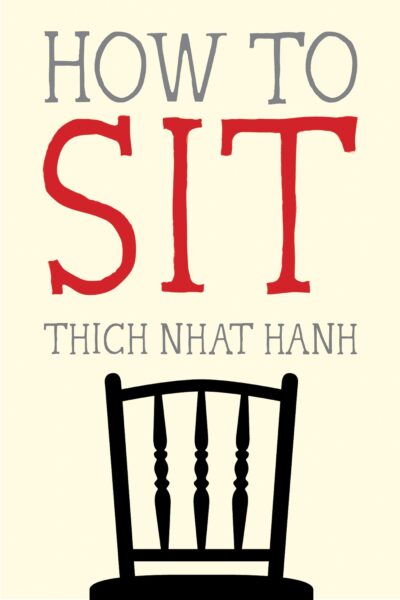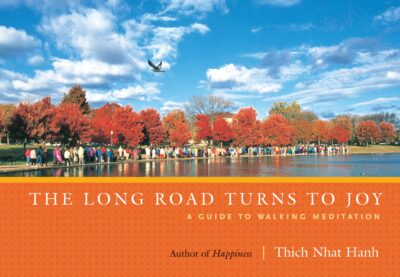Mindfulness is available to us in every moment, not just the special or precious ones. We just have to tune into it throughout the day.
YOU MIGHT ALSO LIKE
CLEAR ALL
BY TEACHER
BY TYPE
FILTER

TOPIC
- Spiritual Practices (44)
- Meditation (32)
- Healing Approaches (31)
- Mindfulness Meditation (28)
- Buddhism (26)
- Self-Development (24)
- Self-Reflection Practices (22)
- Mind-Body Connection (21)
- Building Character (20)
- Self-Discovery (20)
- Stress Management (19)
- Anxiety (18)
- Spiritual Awakening (18)
- Inner Life (17)
- Self-Healing (15)
- Spiritual Life (15)
- Transformation (15)
- Inner Peace (14)
- Breathwork (13)
- Happiness (11)
- Spiritual Healing (11)
- Well-Being (11)
- Connection with Nature (10)
- Focus (10)
- Love (10)
- Self-Control (10)
- Self-Realization (10)
- Spiritual Growth (10)
- Authenticity (9)
- Depression (9)
- Self-Actualization (9)
- Suffering (9)
- Emotional and Mental Health (8)
- Empowerment (8)
- Honoring Emotion (8)
- Human Potential (8)
- Neuroscience (8)
- Search for Purpose (8)
- Self-Love (8)
- Zen Buddhism (8)
- Communication Skills (7)
- Compassion (7)
- Goal Setting (7)
- Intention (7)
- Letting Go (7)
- Perception (7)
- Self-Limiting Beliefs (7)
- Self-Reckoning (7)
- Spiritual Development (7)
- Anger (6)
- Confidence (6)
- Consciousness (6)
- Enlightenment (6)
- Forgiveness (6)
- Grit (6)
- Identity (6)
- Inner Strengths (6)
- Life Challenges (6)
- Relationship with Time (6)
- Resilience (6)
- Self-Compassion (6)
- Trauma Healing (6)
- Athlete Well-Being (5)
- Chronic Health Conditions (5)
- Courage (5)
- Entrepreneurship (5)
- Fear (5)
- Finding Meaning (5)
- Freedom (5)
- Gratitude (5)
- Guided Meditation (5)
- Integrative Medicine (5)
- Joy (5)
- Leadership (5)
- Negative Self-Talk (5)
- Positive Psychology (5)
- Racial Justice (5)
- Science and Spirituality (5)
- Self-Acceptance (5)
- Self-Care (5)
- Social Justice (5)
- Spiritual Direction (5)
- Work-Life Balance (5)
- Yoga (5)
- Acceptance (4)
- Brain Health (4)
- Community Healing (4)
- Curiosity (4)
- Female Empowerment (4)
- Habit Formation (4)
- Integrity (4)
- Interdependence (4)
- Intimacy (4)
- Journaling (4)
- Living with Illness (4)
- Oneness (4)
- Peak Performance (4)
- Personal Development (4)
- Positive Self-Talk (4)
- Prayer (4)
- Racial Healing (4)
- Romantic Relationships (4)
- Self-Reliance (4)
- Social Presence (4)
- Soul Mission (4)
- Stress (4)
- Tibetan Buddhism (4)
- Values (4)
- Vulnerability (4)
- Willpower (4)
- Women’s Well-Being (4)
- Access to Education (3)
- Addiction (3)
- Addiction Recovery (3)
- Aging (3)
- Black Well-Being (3)
- Competition (3)
- Dharma (3)
- Diamond Approach (3)
- Disconnection (3)
- Ecospirituality (3)
- Emotional Intelligence (EQ) (3)
- Energy Healing (3)
- Fellowship and Community (3)
- Generosity (3)
- Grief (3)
- Habits of Mind (3)
- Holism (3)
- Humility (3)
- Illness and Injury (3)
- Insight (Vipassana) Meditation (3)
- Loneliness (3)
- Lovingkindness (3)
- Moral Philosophy (3)
- Neuroplasticity (3)
- Non-Duality (3)
- Nutritional Medicine (3)
- Offering Support to Others (3)
- Patience (3)
- Quantum Physics (3)
- Shadow (3)
- Stoicism (3)
- Storytelling (3)
- Sufism (3)
- Walking Meditation (3)
- Accepting Love (2)
- Activism/Service (2)
- Anger Management (2)
- Awe (2)
- BIPOC Well-Being (2)
- Burnout (2)
- Child’s Trauma (2)
- Cognitive Behavioral Therapy (2)
- Collective Trauma (2)
- Compassion Meditation (2)
- Connection (2)
- Conscious Evolution (2)
- Dark Night of the Soul (2)
- Death and Dying (2)
- Decision Making (2)
- Ego (2)
- Ego Transcendence (2)
- Embodiment (2)
- Empathy (2)
- Exercise (2)
- Failure (2)
- Goddess (2)
- Healthy Eating (2)
- Hope (2)
- Imagination and Creativity (2)
- Incarceration (2)
- Indigenous Healing Approaches (2)
- Intuition (2)
- Islam (2)
- Jealousy/Envy (2)
- Kindness (2)
- Lovingkindness Meditation (2)
- Marriage (2)
- Motivation (2)
- Mysticism (2)
- Naturopathy (2)
- Passion (2)
- Physical Health (2)
- Play (2)
- Poetry (2)
- Positive Thinking (2)
- Productivity (2)
- Relationship Challenges (2)
- Ritual (2)
- Sacred Feminine (2)
- Self-Discipline (2)
- Social Media Addiction (2)
- Sutras (2)
- The Divine (2)
- Trust (2)
- Visualization (2)
- Zen Meditation (2)
- Abandonment (1)
- ADD/ADHD (1)
- Adjusting to Parenthood (1)
- Affirmations (1)
- Alcohol Addiction (1)
- Altered States (1)
- Animal Connection (1)
- Ayurveda (1)
- Belonging (1)
- Body Scan Meditation (1)
- Buddha Nature (1)
- Cancer (1)
- Caregiver Well-Being (1)
- Channeling (1)
- Child’s Challenging Behavior (1)
- Child’s Emotional Growth (1)
- Children’s Well-Being (1)
- Christian Mysticism (1)
- Christianity (1)
- Chronic Pain (1)
- Clairvoyance and Precognition (1)
- Climate Change (1)
- Cognition (1)
- Comparing Belief Traditions (1)
- Compassion Fatigue (1)
- Conflict Resolution (1)
- Creative Well-Being (1)
- Criticism and Rejection (1)
- Death or Loss of a Loved One (1)
- Diet and Nutrition (1)
- Digital Life (1)
- Divination Systems (1)
- Drug Addiction (1)
- Ego Dissolution (1)
- Endurance (1)
- Energy Balancing (1)
- Epigenetics (1)
- Facing Own Death (1)
- Family Dynamics (1)
- Fate (1)
- Following Bliss (1)
- Forest Bathing (1)
- Friendship (1)
- Functional Medicine (1)
- Gender Challenges (1)
- Generational Healing (1)
- Growth Mindset (1)
- Guided Imagery (1)
- Guilt (1)
- Handling a Child’s Illness (1)
- Handling a Loved One’s Illness (1)
- Herbal Supplementation (1)
- Higher Calling (1)
- Hinduism (1)
- Homeopathy (1)
- Imposter Syndrome (1)
- Indigenous Well-Being (1)
- Inner Child (1)
- Judaism (1)
- Jungian Analysis (1)
- Kids and Sports (1)
- Learning Styles (1)
- Life Force Energy (1)
- Lifestyle Medicine (1)
- Longevity (1)
- Manifestation (1)
- Mantra Meditation (1)
- Masculine/Feminine Dynamics (1)
- Memoir (1)
- Mental Health Challenges (1)
- Midlife Crisis (1)
- Mythology (1)
- Native American Beliefs (1)
- Neurodiversity (1)
- Parenting (1)
- Performance Pressure (1)
- Personality Typing (1)
- Problem Solving (1)
- Psychedelic Journey (1)
- Psychology (1)
- Psychology and Spirituality (1)
- Qi (1)
- Racial Discrimination (1)
- Racism (1)
- Reiki (1)
- Relationship with Money (1)
- Religious Experience (1)
- Reproductive Health (1)
- Rest (1)
- Runes (1)
- Self-Worth (1)
- Sex (1)
- Sexual Health (1)
- Shame (1)
- Sleep (1)
- Sleep Disorders (1)
- Social Responsibility (1)
- Speaking Your Truth (1)
- Spiritual Fasting (1)
- Spiritual Quest (1)
- Spirituality and Health (1)
- Subconscious (1)
- Sustainability (1)
- T’ai Chi (1)
- Taoism (1)
- Tarot (1)
- Teacher Burnout (1)
- The Feldenkrais Method (1)
- Traditional Chinese Medicine (1)
- Transcendent Experience (1)
- Trauma (1)
- Visions and Hallucinations (1)
- Whiteness (1)
- Wholeness (1)
- Work Challenges (1)
- Work Ethic (1)
- Work Relationships (1)
FILTER

TEACHER
- Amishi Jha (4)
- Amy Cuddy (4)
- Daniel J. Siegel (4)
- Luisah Teish (4)
- Martin Luther King Jr. (4)
- Queen Afua (4)
- Shauna Shapiro (4)
- The Dalai Lama (4)
- A. H. Almaas (3)
- Bernie S. Siegel (3)
- Bhikku Anālayo (3)
- don Miguel Ruiz (3)
- Ellen Langer (3)
- Joseph Goldstein (3)
- Kabir Helminski (3)
- Kim Eng (3)
- Louise Hay (3)
- Noah Levine (3)
- Rhonda Magee (3)
- Zindel Segal (3)
- Andy Puddicombe (2)
- Ashley Neese (2)
- Caroline Welch (2)
- Chögyam Trungpa (2)
- Dan Millman (2)
- Danya Ruttenberg (2)
- David Steindl-Rast (2)
- Debbie Ford (2)
- Diane Stein (2)
- Harriet Lerner (2)
- Joe Dispenza (2)
- Judson Brewer (2)
- Larry Ward (2)
- Lorin Roche (2)
- Marcus Aurelius (2)
- Marie-Nathalie Beaudoin (2)
- Mark Epstein (2)
- Martin Seligman (2)
- Michael Brown (2)
- Noah Elkrief (2)
- Oprah Winfrey (2)
- Pema Chödrön (2)
- Pierre Teilhard de Chardin (2)
- Rich Roll (2)
- Roger Walsh (2)
- Rudolph Ballentine (2)
- Rumi (2)
- Stephen Levine (2)
- Thubten Chodron (2)
- Adyashanti (1)
- Alan Watts (1)
- Amit Goswami (1)
- Amy Morin (1)
- Amy Scher (1)
- Andrew Harvey (1)
- Andrew Weil (1)
- angel Kyodo williams (1)
- Angela Duckworth (1)
- Brendon Burchard (1)
- Brené Brown (1)
- Brian Tracy (1)
- Bruce Lipton (1)
- Chalene Johnson (1)
- Chan Khong (1)
- Charles Tart (1)
- Charlotte Joko Beck (1)
- Chip Conley (1)
- Craig Hamilton (1)
- Cyndi Dale (1)
- Daisy Khan (1)
- Daniel Amen (1)
- Daniel Goleman (1)
- Danielle MacKinnon (1)
- Deepak Chopra (1)
- don Jose Ruiz (1)
- Dorothy Day (1)
- Edgar Cayce (1)
- Elena Brower (1)
- Elizabeth Gilbert (1)
- Eric Maisel (1)
- Ervin László (1)
- Evelyn Underhill (1)
- Frans Stiene (1)
- Gangaji (1)
- Gary Gach (1)
- Gary Zukav (1)
- Grandmother Flordemayo (1)
- Helen Weng (1)
- J. Krishnamurti (1)
- Jack Canfield (1)
- Jack Kornfield (1)
- James Baraz (1)
- James Hillman (1)
- James Hollis (1)
- Jeffrey Mishlove (1)
- Jetsunma Tenzin Palmo (1)
- JoAnna Hardy (1)
- Joanna Macy (1)
- John C. Parkin (1)
- John Welwood (1)
- José Shinzan Palma (1)
- Joseph M. Marshall III (1)
- Judith Orloff (1)
- Karen Johnson (1)
- Krista Tippett (1)
- Larry Dossey (1)
- Larry Yang (1)
- Leah Guy (1)
- Lodro Rinzler (1)
- Marc Ian Barasch (1)
- Mark Nepo (1)
- Martha Beck (1)
- Matt Kahn (1)
- Michael A. Singer (1)
- Michael Bernard Beckwith (1)
- Mirabai Bush (1)
- Moshé Feldenkrais (1)
- Naomi Shihab Nye (1)
- Norman Fischer (1)
- Osho (1)
- Patanjali (1)
- Phil Jackson (1)
- Phillip Moffitt (1)
- Poppy Jamie (1)
- Rachel Naomi Remen (1)
- Ram Dass (1)
- Raymond Buckland (1)
- Richard Davidson (1)
- Rick Hanson (1)
- Robert A. Johnson (1)
- Robert Augustus Masters (1)
- Rolf Gates (1)
- Rupert Sheldrake (1)
- Russell Brand (1)
- Sarah Powers (1)
- Scott Shute (1)
- Sharon Salzberg (1)
- Shinzen Young (1)
- Stephan Bodian (1)
- Sylvia Boorstein (1)
- Tal Ben-Shahar (1)
- Tara Brach (1)
- Ted DesMaisons (1)
- Thomas Hübl (1)
- Thomas Moore (1)
- Tony Robbins (1)
- Wendell Berry (1)
- Wim Hof (1)
- Yogi Bhajan (1)
- Yung Pueblo (1)










